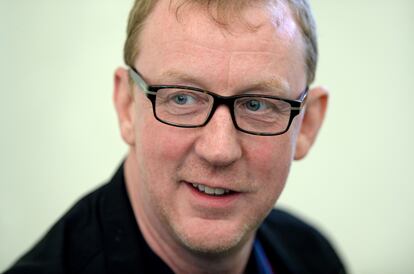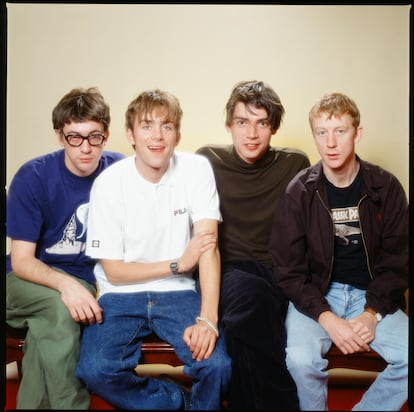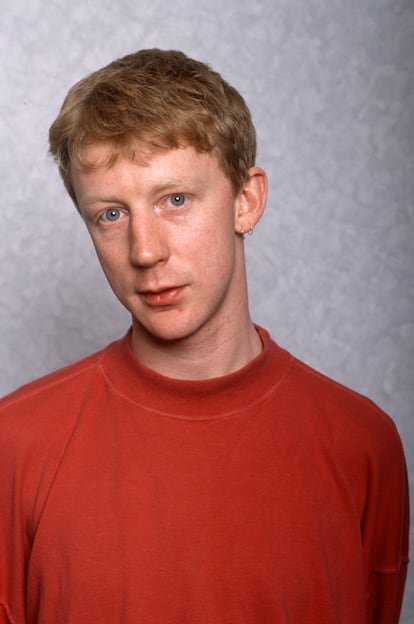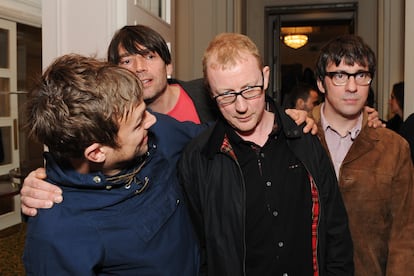Blur drummer Dave Rowntree on Oasis rivalry: ‘We all get along well now’
The British musician may be considered the band’s least popular face, but he was too busy in politics and stargazing to mind. Now, he’s making his debut as a singer and songwriter

Of the four members of Blur, Dave Rowntree, 58, may be the least popular and charismatic. But the shy drummer is a fundamental element of the band that defined Britpop. This year, Blur will reunite to perform live after eight years of silence. Rowntree confirms that he has an excellent relationship with Damon Albarn (vocals), Graham Coxon (guitar) and Alex James (bass), and he believes that the band will produce new music as a result of the tour. “It’s too early to say yet, but I’d be surprised if we don’t record anything,” says the drummer.
In a way, this introduction does Rowntree a disservice because he is one of the music scene’s most multifaceted people. Dave Rowntree is, or has been, a left-wing politician, criminal lawyer, radio aficionado, astronomer, animator and soundtrack composer. But that nerdy resume didn’t prevent him from fully experiencing the excesses of 1990s British pop-rock: he had serious addictions to alcohol and cocaine, although he says he’s been clean since 2007.
Radio Days
A native of Colchester, UK, Rowntree looks like an affable middle-aged English gentleman onscreen; he still has some of his iconic ginger hair. He is in his home studio (150 kilometers southwest of London). On his first solo album, Radio Songs, he’s the singer and songwriter and plays multiple instruments. And, yes, the album has a lot to do with his background in radio.

“I’ve had a constant relationship with radio since I was a kid,” he notes. “My father was a radio engineer in the British Air Force. He loved electronics and radio and devoted his whole life to it. He passed that passion down to me. Just as many fathers would take their kids to soccer games or on fishing trips, he and I would sit around the kitchen table and set up radios, plug in an antenna in the backyard and listen to stations from all over the world. I loved tuning the dial to the long wave, listening to all kinds of exotic music…in foreign languages, dreaming of what life would be like in those places.”
But radio’s influence on his life didn’t end there. “To a certain extent, my political awakening also came about because of radio,” he adds. “I grew up in the south of England with a fairly conventional family. The kind of news we listened to, or the newspapers we read, had a very similar stance on the same events, but, even as a child, listening to outside broadcasters opened my eyes; it made me realize that events could be interpreted in more than one way. I guess that’s where my turn to the left began. I also listened to the pop music stations, of course, but for me, above all, it educated me about technology.” And he continues his radio work. “I have a special radio license that allows me to build and design gadgets; I still do it, and I enjoy it,” he says.
He has also been on the other side of the dial. He hosted his own show, The Dave Rowntree Show, which started in 2014 on the British network XFM; in 2020 and 2021, the program moved to Spotify. In each episode, he selected several favorite songs grouped around a different theme and told stories about them. “It’s fun to do, but it’s very time consuming. During the pandemic, which is when I decided to take it to the podcast, I had that kind of time, so I could spend days at a time preparing it,” he notes.
England doesn’t dream
Despite the musician’s comments about his relationship with his father and the radio, however, he flatly rejects the notion that his album (where mid-tempos predominate in the form of electronic pop, not too distant from Blur’s more reflective songs) is nostalgic. “It’s not a way of looking back at an idealized childhood. Actually, it was a bad childhood. I grew up in the 1970s, a horrendous period in my country’s history. The economy was a mess, there were continuous strikes and riots... I have no interest in going back to that time. On the other hand, all those things are coming back into British politics again. The right is on the rise again all over the world. Social services have been slashed; they no longer work, and as a result, there are massive public sector worker strikes. The government remains intransigent; it doesn’t seem to have any interest in finding a solution.”

“I wrote the album around the idea that people look back and think things were better in the old days,” he explains. “And they weren’t. Despite everything, things are better now. You have to make them better, though. We have to make an effort to get along better with our neighbors. I think my country has lost all that.”
At this point in the conversation, the political Rowntree comes to the fore, and he speaks more animatedly about this subject than anything else. In 2002, he joined the Labor Party. He ran for alderman several times in different London boroughs; he won the seat in Norfolk county and served as an alderman between 2017 and 2021. “I’m actually a local activist. I like to dedicate myself to my ward, see what problems there are and what I can do to help.”
I ask him if he believes that becoming a musician is more difficult now than when he started. “Of course it is. It’s always been hard, but now it’s gone to the extreme,” he says, focusing on the British reality. “Our music industry was very dependent on the European Union; with it, we had a potential audience of 500 million people. Right now, touring Europe is a very expensive and complicated business. Each country you go to has different legislation. It’s not a problem for Blur; we’ll continue to do well. But it’s a problem for smaller, younger bands and bands from less affluent backgrounds. A lot of them are leaving the music industry, and it’s a shame, because this was one of the few things the UK was a leader in: producing and exporting pop music. The government insisted that the music industry would not get worse after Brexit, that it would get better. And they ducked their heads and did absolutely nothing. They didn’t even take us into consideration when negotiating Brexit. It has happened in other sectors, [too]: the fishing industry has collapsed. The UK is extraordinarily incompetent right now. The pound sterling has devalued by 20%; that’s a staggering price for no benefits whatsoever.”
Life on Mars
When I suggest that, as Blur’s drummer, Rowntree became rich and famous, he grimaces and says in mock annoyance, “I won’t have you describing me as super-wealthy.” And the facts may partly back him up. “I’ve always tried to pursue other projects,” he says. When the group stopped recording after the 2003 release of its Think Tank album, he finished law school and worked for five years as a criminal lawyer (“I found it very interesting”). He also began a career composing music for film and television.

“I’ve done really well, and it’s given me the confidence to record my own songs,” notes the musician, whose first major job in the industry was scoring the award-winning documentary Bros: After the Screaming Stops, about the short-lived 1980s pop duo. There isn’t any link between Bros and Blur. Rowntree observes that “we were a bit old by the time they came along, but their story is an interesting one: two young men, who were scarred rather badly by their experiences in the music industry. They haven’t spoken to each other since the band broke up. They tried to organize a massive concert without speaking to each other. And the cameras recorded it all, from start to finish. It’s a tragic and hilarious story at the same time, and I enjoyed it,” says Rowntree, whose relationship with the industry has always been much smoother than that. In addition to his experience as a commissioned composer, he opened a digital animation studio, Nanomation (he directed two episodes of Empire Square, a shoe that might be the perfect blend of South Park and the visual elements of Damon Albarn’s Gorillaz).
Beyond those interests, Rowntree is also fascinated by astronomy. He promoted and financially supported the Mars Express mission, sponsored by the British government and the European Space Agency to investigate whether there might be life on Mars. “I was lucky enough to own a small telescope as a child,” he explains. “I would spend my nights looking through it. I still have telescopes. In fact, I’m studying part-time for a degree in astronomy, to learn about it more formally. Space has always interested me; I think it’s a very spiritual thing because you realize how insignificant our planet is in the grand scheme of things. It helps you see your place in the universe.”
Speaking of perspective, Rowntree downplays Blur’s legendary rivalry with Oasis. He says that it was something that both sides sought, and it benefited them both. “Now, we all get along well.” Although he has finally dared to show his chops as a solo artist, Rowntree makes it clear that he will not ask for a larger role in Blur if the band records again. “We work very collaboratively, and it works really well. I’ve always written songs, ever since I was a kid; the only thing I lacked was the confidence and time to show them off in public. The four members of Blur always bring our ideas to every song,” he says.
And he hasn’t been afraid to stand onstage and sing after a lifetime of hiding in the back, behind his bandmates. “I enjoy it very much. It all comes very naturally to me; I’m not shy in front of an audience. I’ve already done a lot of that in my other roles, as a lawyer and as a politician, so it’s not something that scares me. Mind you, I wouldn’t recommend it to other people as the ideal path for pursuing a musical career.”
Sign up for our weekly newsletter to get more English-language news coverage from EL PAÍS USA Edition
Tu suscripción se está usando en otro dispositivo
¿Quieres añadir otro usuario a tu suscripción?
Si continúas leyendo en este dispositivo, no se podrá leer en el otro.
FlechaTu suscripción se está usando en otro dispositivo y solo puedes acceder a EL PAÍS desde un dispositivo a la vez.
Si quieres compartir tu cuenta, cambia tu suscripción a la modalidad Premium, así podrás añadir otro usuario. Cada uno accederá con su propia cuenta de email, lo que os permitirá personalizar vuestra experiencia en EL PAÍS.
¿Tienes una suscripción de empresa? Accede aquí para contratar más cuentas.
En el caso de no saber quién está usando tu cuenta, te recomendamos cambiar tu contraseña aquí.
Si decides continuar compartiendo tu cuenta, este mensaje se mostrará en tu dispositivo y en el de la otra persona que está usando tu cuenta de forma indefinida, afectando a tu experiencia de lectura. Puedes consultar aquí los términos y condiciones de la suscripción digital.








































